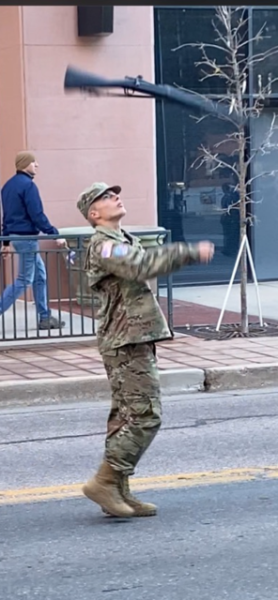Black Friday Brawls
America’s favorite contact sport is quickly approaching and staying safe is everyone’s number one priority, other than the money-saving deals.
It is no surprise that Black Friday is considered one of the most dangerous days of the year. Countless injuries, robberies, and even deaths happen every year, and continue to raise awareness about the importance of putting safety first. However, the madness still continues to worsen and questions have risen concerning the need for Black Friday at all; as a result, citizens are turning to the internet or “Cyber Monday.”
Cyber Monday is a marketing term for the Monday after the Thanksgiving holiday in the United States. The term “Cyber Monday” was created by marketing companies to persuade people to shop online. The term was coined by Ellen Davis and made its debut on November 28, 2005.
There are many myths about the origin of Black Friday, from Wall Street financiers selling gold to earn back money from the U.S. Gold Crash of 1989 to laborers calling in “sick” for a day off of work. The true story is that back in the 1950’s, police in the city of Philadelphia used the term to describe the chaos that ensued on the day after Thanksgiving when hordes of suburban shoppers and tourists flooded into the city in advance of the big Army-Navy football game held on that Saturday every year. Not only would Philly cops not be able to take the day off, but they would have to work extra-long shifts to deal with the additional crowds and traffic. Shoplifters would also take advantage of the bedlam in stores to make off with merchandise, adding to the law enforcement headache. By 1961, “Black Friday” had caught on in Philadelphia, to the extent that the city’s merchants and boosters tried to unsuccessfully change it to “Big Friday” in order to remove the negative connotation that comes with the name. The term didn’t spread to the rest of the country until much later; however, and as recently as 1985, it wasn’t in common use nationwide.
The combination of too-good-to-be-true deals and shoppers hopped up on copious amounts of caffeine and tryptophan can be dangerous, though. Overzealous drivers can make parking lots a zoo and sleep-deprived shoppers are less likely to pay attention to the road. Unfortunately, Black Friday, which is considered the unofficial start to the holiday season, also brings out thieves, pickpockets, and others who are looking to take advantage of unsuspecting shoppers. It is out of everyone’s best interest to prepare and practice safe shopping while out on the night of Thanksgiving and Black Friday.
Whether you’re leaving the house at the crack of dawn (or dusk) in search of Black Friday deals or saving your holiday shopping for the last minute, keep these safety tips, courtesy of the National Crime Prevention Council, in mind when navigating the parking lots and wandering the aisles.
- Lock all doors and roll up all windows even when leaving the car for a short period of time.
- When shopping, keep gifts in the trunk or hidden from view in the interior of the car. Also, put all of your packages in the trunk before departing one parking lot and driving to another. Waiting until your next shopping destination allows others to see packages go into the trunk of your car and then you are entering the mall or store.
- Avoid parking next to vans and large trucks that block your space from the general vision of others.
- Make a mental note or write down exactly where you park your car to avoid wandering around longer than necessary.
- Have your keys in hand when leaving a store. Also, look underneath your car before you reach it; criminals have been known to lie underneath in wait.
- Remember there is increased safety in numbers. Avoid walking alone and leave malls and stores well before closing time to assure a more active parking lot. Ask mall security to walk you to your car if you feel you are not safe.
- Keep purses zipped and close to your body. Never leave a purse unattended in a shopping cart where it is more susceptible to theft.
- If you are shopping with children, make a plan in case you are separated from each other.
- Select a central meeting place.
- Teach them to know they can ask mall personnel or store security employees if they need help.
- Have them memorize or keep your cell phone number handy.
- Keep up-to-date photos and accurate descriptions of each child electronically with AlertID’s My Family Wallet™. Should they go missing, this information can be sent quickly to law enforcement when every moment counts.
- Do not buy more than you can carry. Plan ahead by taking a friend with you or asking a store employee to help you carry your packages to the car.
- Save all receipts. Print and save all confirmations from your online purchases. Start a file folder to keep all receipts together and to help you verify credit card or bank statements as they come in.
- Don’t flash the cash. Consider alternate options to pay for your merchandise, such as one-time or multi-use disposable credit cards or money orders, including at online stores.
*Consider downloading a safety app, such as SafeTrek (available for both Apple and Android), that tracks your location and ensures your safety and alerts police if you are in real danger*

Salutations! My name is Ashlie Steel and I am the Lifestyle Columnist for the Jet Stream Journal. I am a senior, so this is my first and last year participating...













Cole Pearne • Nov 16, 2016 at 12:31 pm
I knew Black Friday was crazy, but I never thought about how to prepare for the day! Very helpful!
Amber Musselman • Nov 16, 2016 at 12:30 pm
glad to see people are concerned with others safety and not just the deals! great article
Luke Negley • Nov 16, 2016 at 12:29 pm
Jake makes a very good point! I will be sure to take these precautions if I ever decide to go Black Friday shopping.
Whitney • Nov 16, 2016 at 12:25 pm
This so interesting! I never thought about using disposable credit cards or writing down where I park! Now I am so prepared for black friday!
Maria Mettler • Nov 16, 2016 at 12:23 pm
Black Friday is always so crazy. Very interesting and great article!
Jake Werner • Nov 16, 2016 at 12:17 pm
Truly amazing how people will brawl each other for materialistic items the day after a holiday that focuses on being thankful for what you have and the people you know…